- Home
- Cameras
- Cameras Features
- CES 2014: Cameras roundup
CES 2014: Cameras roundup
By Rohan Swamy | Updated: 11 January 2014 13:20 IST
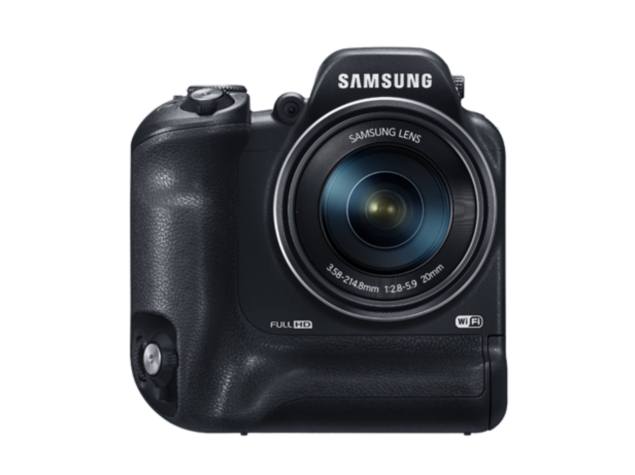
Click Here to Add Gadgets360 As A Trusted Source

Advertisement
The Consumer Electronics Show (CES) 2014, which is held in Las Vegas, is not exactly a place where camera enthusiasts and professionals might go to shop for devices, but that didn't stop the major camera players from showcasing devices from their respective kitties at the show. Amongst others, there were the likes of Canon, Nikon, Fujifilm, Olympus, Pentax, Sony and Samsung who showcased their point and shoots and DSLRs. We take a look at the models that grabbed eyeballs at the event.
Point and shoot, bridge cameras
One of the biggest highlights at CES has been the numerous point-and-shoot cameras showcased for the general public. The Canon PowerShot N with its square design was definitely eye-catching. With a $350 (roughly Rs. 20,000) tag the biggest feature on it is the rear facing camera and that the device can use both the cameras simultaneously. It has a 12-megapixel High-Sensitivity CMOS sensor, with the DIGIC VI image processor - the highest ever on a PowerShot. The lens has a shorter 5x optical zoom, but it has an f/1.8 aperture with optical image stabilization. The 3-inch capacitive tilting touchscreen onboard though, strangely doesn't tilt the full 90 degrees.
Canon also launched the 16-megapixel PowerShot SX600 HS at $250 (roughly Rs. 15,500) in Canon's long-zoom SX series, featuring an 18x zoom and using a DIGIC IV image processor. The appeal of the SX600 HS is the very compact size - almost like an ELPH. The camera records full-HD, and a Mobile Device Connect button puts you into Wi-Fi mode for transfers and uploads; there's also NFC for quick pairing with a smartphone. The SX600 HS has Canon's Hybrid Auto feature that records short clips as you use the camera, then putting it into a short highlight reel. Expect this camera in May, in black and white.
In addition to that Samsung unveiled four point and shoot cameras - the WB1100F, the WB50F, the WB350F and the WB35F, apart from the WB2200F bridge camera. Another important factor that came in was the use of Wi-Fi and tag and share. Manufacturers are targeting the general consumer base as one that can use the point-and-shoot camera as a convergence device.
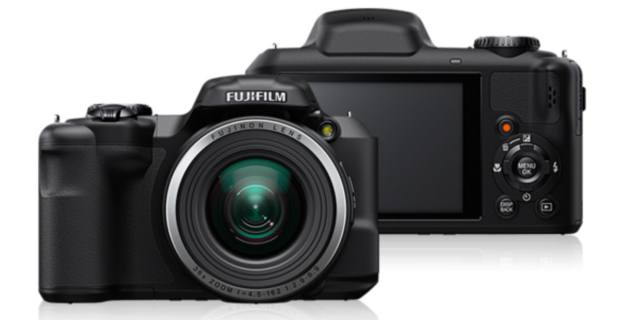
Fujifilm too got into the act and launched the FinePix S1, the S9200, the S9400W and the S8600. In addition a rugged waterproof camera, the XP70 is also in the pipeline. The cameras came with a price tag range of $200-$500 (roughly Rs. 12,600 - Rs. 30,000). What was interesting to note that along with rugged exteriors the lenses on the cameras too have been improved with additional zoom. It is an interesting target audience they are reaching out to- from the consummate professionals to the more adventurous ones.
Nikon unveiled five new models for their CoolPix series namely the L830, the S6800, the S5300, the S3600, and the L30. The five models are all in the $119 - $299 (roughly Rs. 7,400 - Rs. 18,500) price range.
Mirrorless interchangeable lens cameras and DSLRs
While point and shoot, and bridge cameras were definitely a hit with those present at the CES, another focus of the show was mirrorless cameras and DSLRs. Polaroid bought the Android-powered iM1836 to CES. With a $400 (roughly Rs. 25,000) price tag, the Polaroid iM1836 featured interchangeable lenses, and a sensor just behind the barrel.
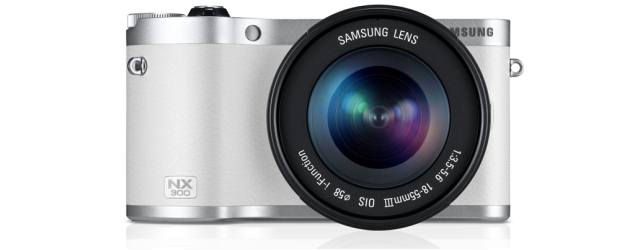 Samsung also launched its MILC camera, the NX300, which has an APS-C sensor with a 20.3-megapixel still capturing power under its hood. Other features are a 100 to 25,600 ISO range and a 3.3 inch AMOLED Screen. Also bundled in is a 20-50 mm kit lens and can shoot 3D pictures when combined with a $500 3D-capable lens. The camera is priced at $750 (roughly Rs. 47,000), which is one of the more pricey cameras that debuted at CES 2014.
Samsung also launched its MILC camera, the NX300, which has an APS-C sensor with a 20.3-megapixel still capturing power under its hood. Other features are a 100 to 25,600 ISO range and a 3.3 inch AMOLED Screen. Also bundled in is a 20-50 mm kit lens and can shoot 3D pictures when combined with a $500 3D-capable lens. The camera is priced at $750 (roughly Rs. 47,000), which is one of the more pricey cameras that debuted at CES 2014.
Finally, Nikon introduced its J3 and S1 mirrorless cameras. The J3 comes in at $600 (roughly Rs. 37,000) with a kit lens, while the S1 will be available for $500 (roughly Rs. 32,000). Both are designed as step-up models for current point-and-shoot owners. In addition they also debuted the D3300, the new entry-level DSLR with a new lens dubbed the Mark-II. The D3300 is priced at $649 (roughly Rs. 41,000) along with the kit lens. The lens will also be available on its own for $249 (roughly Rs. 15,500).
Sony also unveiled the lightest (as claimed) interchangeable lens camera with Wi-Fi connectivity, the Sony Alpha 5000. The BIONZ X processor paired with the APS-C sized sensor on the Alpha 5000 along with the 20.1-megapixel shooting capabilities make it a robust shooter.
Wearable cameras
Another category of cameras that made a large impact at CES this year were from the wearable section. Polaroid launched its $99 (roughly Rs. 6,200) C3- a 1.3-inch square camera, which captures images at 720p or VGA video and 5-megapixel stills. With built-in magnets under the skin, multiple units can be attached to the wearer. It is also water resistant up till 6.5 feet. Another similar product, the MeMini camera Kickstarter project, also uses magnets to attach to the wearer and is priced at $169 for those who are helping fund the project. It can shoot 1080p HD video in a loop from five seconds to five minutes.
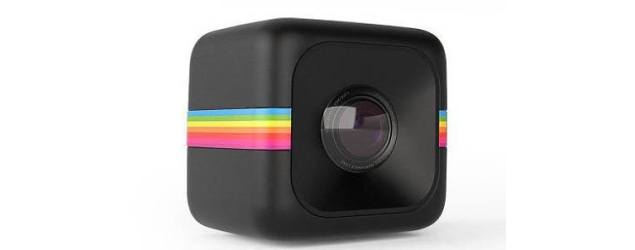 Liquid Image brought out the Ego LS 4G LTE camera, which can be clipped to a jacket, for a price tag of $199.99 (roughly Rs. 12,400). It records full-HD video at 30 fps or 720p video at 60fps, and can stream video live, via an accessory, over a 4G LTE network. The somewhat steeply priced Autographer $499 (roughly Rs. 31,000) uses the five onboard sensors ambient light, accelerometer, magnetometer, passive infrared motion, and temperature -- to determine when to shoot 5-megapixel stills (though there's a shutter release if you want to manually shoot, too). A built-in GPS module keeps track of where your shots are taken. The camera can capture up to 2,000 photos a day, shooting for up to 12 hours on a single charge, and can store 16,000 images.
Liquid Image brought out the Ego LS 4G LTE camera, which can be clipped to a jacket, for a price tag of $199.99 (roughly Rs. 12,400). It records full-HD video at 30 fps or 720p video at 60fps, and can stream video live, via an accessory, over a 4G LTE network. The somewhat steeply priced Autographer $499 (roughly Rs. 31,000) uses the five onboard sensors ambient light, accelerometer, magnetometer, passive infrared motion, and temperature -- to determine when to shoot 5-megapixel stills (though there's a shutter release if you want to manually shoot, too). A built-in GPS module keeps track of where your shots are taken. The camera can capture up to 2,000 photos a day, shooting for up to 12 hours on a single charge, and can store 16,000 images.
Panasonic also debuted its first 4K Ultra HD wearable camera, an unnamed device that will launch in late-2014. The camera was capable of transmitting videos onto a larger screen via a mini-HDMI port and despite the compactness produced sharp videos.
Point and shoot, bridge cameras
One of the biggest highlights at CES has been the numerous point-and-shoot cameras showcased for the general public. The Canon PowerShot N with its square design was definitely eye-catching. With a $350 (roughly Rs. 20,000) tag the biggest feature on it is the rear facing camera and that the device can use both the cameras simultaneously. It has a 12-megapixel High-Sensitivity CMOS sensor, with the DIGIC VI image processor - the highest ever on a PowerShot. The lens has a shorter 5x optical zoom, but it has an f/1.8 aperture with optical image stabilization. The 3-inch capacitive tilting touchscreen onboard though, strangely doesn't tilt the full 90 degrees.
Canon also launched the 16-megapixel PowerShot SX600 HS at $250 (roughly Rs. 15,500) in Canon's long-zoom SX series, featuring an 18x zoom and using a DIGIC IV image processor. The appeal of the SX600 HS is the very compact size - almost like an ELPH. The camera records full-HD, and a Mobile Device Connect button puts you into Wi-Fi mode for transfers and uploads; there's also NFC for quick pairing with a smartphone. The SX600 HS has Canon's Hybrid Auto feature that records short clips as you use the camera, then putting it into a short highlight reel. Expect this camera in May, in black and white.
In addition to that Samsung unveiled four point and shoot cameras - the WB1100F, the WB50F, the WB350F and the WB35F, apart from the WB2200F bridge camera. Another important factor that came in was the use of Wi-Fi and tag and share. Manufacturers are targeting the general consumer base as one that can use the point-and-shoot camera as a convergence device.
Fujifilm too got into the act and launched the FinePix S1, the S9200, the S9400W and the S8600. In addition a rugged waterproof camera, the XP70 is also in the pipeline. The cameras came with a price tag range of $200-$500 (roughly Rs. 12,600 - Rs. 30,000). What was interesting to note that along with rugged exteriors the lenses on the cameras too have been improved with additional zoom. It is an interesting target audience they are reaching out to- from the consummate professionals to the more adventurous ones.
Nikon unveiled five new models for their CoolPix series namely the L830, the S6800, the S5300, the S3600, and the L30. The five models are all in the $119 - $299 (roughly Rs. 7,400 - Rs. 18,500) price range.
Mirrorless interchangeable lens cameras and DSLRs
While point and shoot, and bridge cameras were definitely a hit with those present at the CES, another focus of the show was mirrorless cameras and DSLRs. Polaroid bought the Android-powered iM1836 to CES. With a $400 (roughly Rs. 25,000) price tag, the Polaroid iM1836 featured interchangeable lenses, and a sensor just behind the barrel.
Finally, Nikon introduced its J3 and S1 mirrorless cameras. The J3 comes in at $600 (roughly Rs. 37,000) with a kit lens, while the S1 will be available for $500 (roughly Rs. 32,000). Both are designed as step-up models for current point-and-shoot owners. In addition they also debuted the D3300, the new entry-level DSLR with a new lens dubbed the Mark-II. The D3300 is priced at $649 (roughly Rs. 41,000) along with the kit lens. The lens will also be available on its own for $249 (roughly Rs. 15,500).
Sony also unveiled the lightest (as claimed) interchangeable lens camera with Wi-Fi connectivity, the Sony Alpha 5000. The BIONZ X processor paired with the APS-C sized sensor on the Alpha 5000 along with the 20.1-megapixel shooting capabilities make it a robust shooter.
Wearable cameras
Another category of cameras that made a large impact at CES this year were from the wearable section. Polaroid launched its $99 (roughly Rs. 6,200) C3- a 1.3-inch square camera, which captures images at 720p or VGA video and 5-megapixel stills. With built-in magnets under the skin, multiple units can be attached to the wearer. It is also water resistant up till 6.5 feet. Another similar product, the MeMini camera Kickstarter project, also uses magnets to attach to the wearer and is priced at $169 for those who are helping fund the project. It can shoot 1080p HD video in a loop from five seconds to five minutes.
Panasonic also debuted its first 4K Ultra HD wearable camera, an unnamed device that will launch in late-2014. The camera was capable of transmitting videos onto a larger screen via a mini-HDMI port and despite the compactness produced sharp videos.
Comments
Get your daily dose of tech news, reviews, and insights, in under 80 characters on Gadgets 360 Turbo. Connect with fellow tech lovers on our Forum. Follow us on X, Facebook, WhatsApp, Threads and Google News for instant updates. Catch all the action on our YouTube channel.
Further reading:
Autographer, Cameras, Canon, Canon PowerShot N, CES, CES 2014, Fujifilm, Fujifilm FinePix S1, FujiFilm S9200, FujiFilm S9400W FujiFilm S8600, FujiFilm XP70, Liquid Image, Liquid Image Ego LS 4G LTE, MeMini, Nikon, Nikon D3300, Nikon J3, Nikon S1, Panasonic, Polaroid, Polaroid C3, Polaroid iM1836, PowerShot, PowerShot SX600 HS, Samsung, Samsung NX300, Samsung WB1100F, Samsung WB2200F, Samsung WB350F, Samsung WB35F, Samsung WB50F, Sony, Sony Alpha 5000
Related Stories
Popular on Gadgets
- Samsung Galaxy Unpacked 2025
- ChatGPT
- Redmi Note 14 Pro+
- iPhone 16
- Apple Vision Pro
- Oneplus 12
- OnePlus Nord CE 3 Lite 5G
- iPhone 13
- Xiaomi 14 Pro
- Oppo Find N3
- Tecno Spark Go (2023)
- Realme V30
- Best Phones Under 25000
- Samsung Galaxy S24 Series
- Cryptocurrency
- iQoo 12
- Samsung Galaxy S24 Ultra
- Giottus
- Samsung Galaxy Z Flip 5
- Apple 'Scary Fast'
- Housefull 5
- GoPro Hero 12 Black Review
- Invincible Season 2
- JioGlass
- HD Ready TV
- Laptop Under 50000
- Smartwatch Under 10000
- Latest Mobile Phones
- Compare Phones
Latest Gadgets
- iQOO 15 Ultra
- OPPO A6v 5G
- OPPO A6i+ 5G
- Realme 16 5G
- Redmi Turbo 5
- Redmi Turbo 5 Max
- Moto G77
- Moto G67
- HP HyperX Omen 15
- Acer Chromebook 311 (2026)
- Lenovo Idea Tab Plus
- Realme Pad 3
- HMD Watch P1
- HMD Watch X1
- Haier H5E Series
- Acerpure Nitro Z Series 100-inch QLED TV
- Asus ROG Ally
- Nintendo Switch Lite
- Haier 1.6 Ton 5 Star Inverter Split AC (HSU19G-MZAID5BN-INV)
- Haier 1.6 Ton 5 Star Inverter Split AC (HSU19G-MZAIM5BN-INV)
© Copyright Red Pixels Ventures Limited 2026. All rights reserved.
-
 Generative AI Has 'Zero Part' in GTA 6, Says Take-Two CEO Strauss Zelnick
Generative AI Has 'Zero Part' in GTA 6, Says Take-Two CEO Strauss Zelnick
-
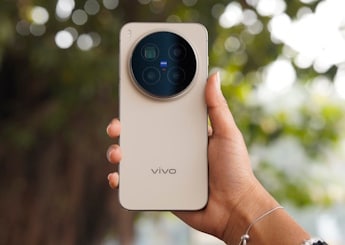 Vivo X300 Ultra Tipped to Launch in India With Four Rear Cameras, 7,000mAh Battery
Vivo X300 Ultra Tipped to Launch in India With Four Rear Cameras, 7,000mAh Battery
-
 Apple’s Low-Cost MacBook With A18 Chip, 8GB RAM to Launch at a Competitive Price: Report
Apple’s Low-Cost MacBook With A18 Chip, 8GB RAM to Launch at a Competitive Price: Report
-
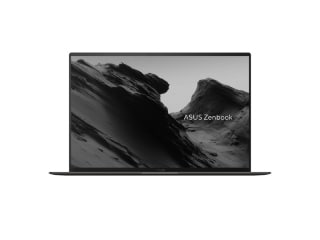 Asus Zenbook S16, Zenbook 14 Launched in India Alongside New Vivobook Models: Price, Specifications
Asus Zenbook S16, Zenbook 14 Launched in India Alongside New Vivobook Models: Price, Specifications











